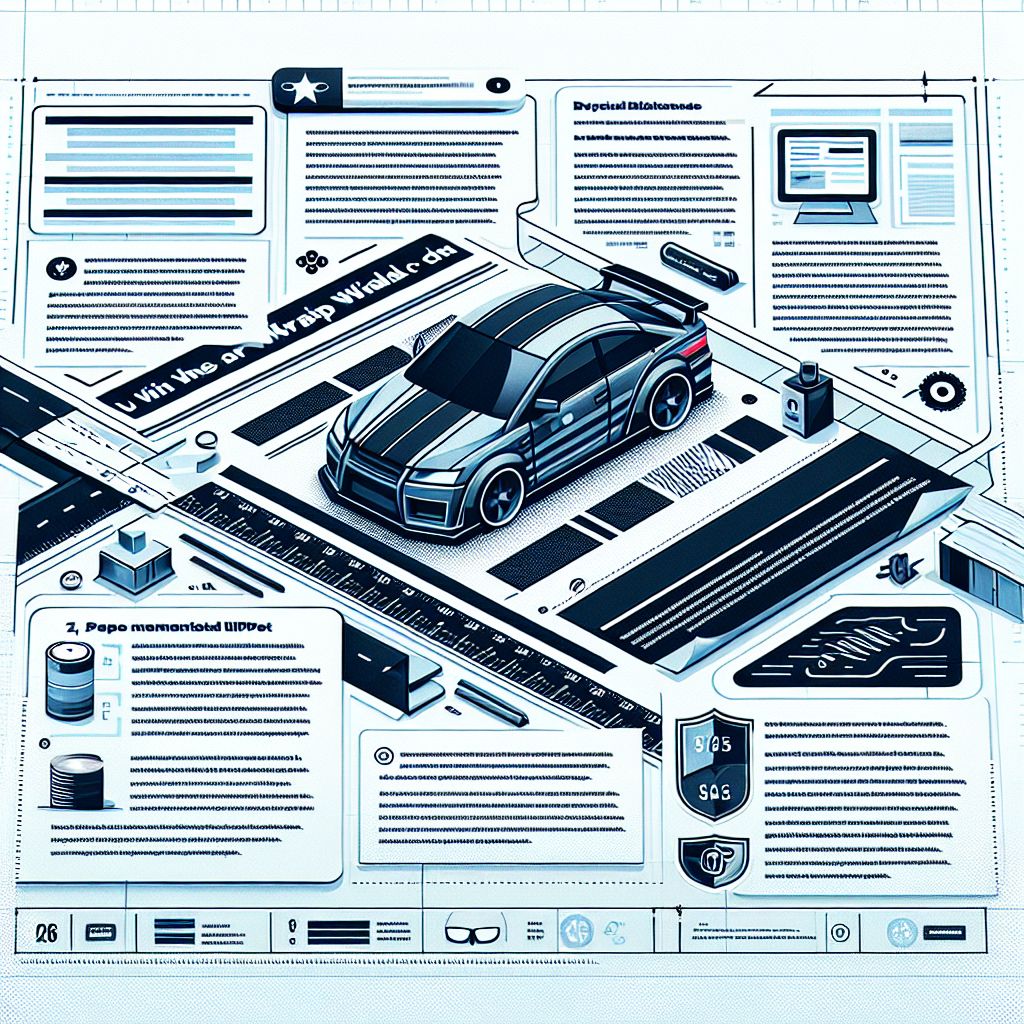
Article-at-a-Glance
- MVC must be notified of color changes due to wraps for vehicle registration.
- New Jersey requires commercial plates for vehicles with business wraps.
- Perforated vinyl wraps are subject to the same regulations as window tints in NJ.
- Legal compliance is necessary to avoid fines and maintain the wrap’s integrity.
- Choosing a certified installer is crucial for ensuring quality and adherence to regulations.
The Basics of Car Wrapping in NJ
Definition and Benefits of Car Wrapping
Car wrapping involves covering your vehicle with large vinyl graphics or decals. These wraps can range from full-vehicle coverings to smaller graphics that are used for advertising or personal expression. Not only do wraps provide a new look without the need for a costly and permanent paint job, but they also protect your vehicle’s original paint from scratches and UV damage.
General Guidelines for Vehicle Wraps in NJ
Here’s what you need to know about New Jersey’s car wrap regulations:
- Commercial Plates: If your wrap is for business purposes, you’ll need commercial plates. Your company name, city, and state must be displayed properly on the vehicle.
- MVC Notification: A color change due to a wrap must be reported to the New Jersey MVC for vehicle registration purposes.
- Window Wraps: Perforated vinyl wraps on windows must comply with the state’s window tinting laws. That means no wraps on the front windshield and front side windows.
These guidelines are not just recommendations; they are enforced by law. Adhering to them keeps you from running into trouble with fines or having to remove your wrap.
Legal Design and Placement
Approved Designs for NJ Car Wraps
In New Jersey, the design of your car wrap must be in good taste. That means no offensive imagery or language. This isn’t just about being considerate; it’s about following community standards and avoiding potential legal issues.
Placement Do’s and Don’ts
The placement of your wrap is just as important as the design.
- Do: Wrap the body of your vehicle, including the hood, sides, and rear.
- Don’t: Cover your license plates, windows that are not legally allowed to be tinted, or any other areas that could obstruct your vision or identification of your vehicle.
Remember, the goal is to enhance your vehicle’s look without compromising safety or visibility. So, let’s make sure your wrap looks great and follows the rules.
Alright, you’ve got the basics down. Stay tuned for more in-depth details on how to navigate the car wrapping process in New Jersey, including MVC notification requirements and finding a qualified installer.

Notification and Documentation
Once you’ve decided on a car wrap, the next step is to make sure you’re following the proper procedures for notification and documentation. In New Jersey, there are specific times and reasons you need to notify the Motor Vehicle Commission (MVC ). Doing this correctly is vital to ensure your vehicle’s registration stays up to date and reflects the current state of your car.
When to Notify the New Jersey MVC
You must notify the New Jersey MVC of any significant changes to your vehicle. This includes color changes due to a car wrap. You might not think of a wrap as a permanent change, but it can affect how your vehicle is identified and thus needs to be documented.
Most importantly, if your vehicle is wrapped for commercial purposes, you’ll need to have commercial plates, and the vehicle registration must reflect the name of your business. This is important because it distinguishes personal vehicles from those used for commercial activities.
What to Submit to the MVC
When you notify the MVC about your car wrap, you’ll need to provide the following:
- Your vehicle’s registration number.
- A description of the wrap, including the predominant colors.
- If applicable, your business name and information for commercial registration.
Keep in mind that failure to notify the MVC of these changes can lead to complications with your vehicle’s registration and potential fines.
Moving Forward with Your Car Wrap
Before you get your car wrapped, there are a few steps you need to take to ensure everything goes smoothly and you remain within the boundaries of the law. It’s important to understand the state regulations for car wraps to avoid any legal issues.
Steps to Ensure Legal Compliance Before Wrapping Your Car
First, you need to choose your design and ensure it meets New Jersey’s regulations. Next, you’ll want to find a reputable installer who can do the job to a high standard while ensuring compliance with all local laws.
- Check with your local MVC to confirm the latest regulations on car wraps.
- Decide on the design and placement of your wrap, avoiding any restricted areas such as windows that need to remain clear.
- Choose a certified and experienced installer who is familiar with New Jersey’s regulations.
- Notify the MVC of any changes to your vehicle’s color or if you are adding commercial branding.
Following these steps will help you avoid any legal issues and ensure your car wrap experience is a positive one.
Finding a Licensed and Compliant Car Wrap Installer
Choosing the right installer is crucial. Look for someone who is not only skilled in the art of car wrapping but also knowledgeable about New Jersey’s specific regulations. Ask for certifications, check reviews, and don’t hesitate to ask for examples of their previous work. A trustworthy installer will be transparent about their qualifications and happy to showcase their expertise.
| Car Wrap Type | Legal Status in New Jersey |
|---|---|
| Holographic | Legal |
| Mirror | Legal, with restrictions* |
| Gloss | Legal |
| Matte | Legal |
| People’s Faces | Legal |
| Pornographic | Illegal |
| Violence | Legal, with considerations |
References:
NJ Legislature,
National Car Wraps,
Understanding Wrap Definitions
Before we go further, let’s clarify what we mean by different types of car wraps:
Full Wrap: Covers the entire vehicle, including the roof, hood, and all sides. For more details on state regulations for car wraps, check your local MVC guidelines.
Partial Wrap: Covers only a specific part of the vehicle, like the doors or rear.
Graphics and Decals: Smaller designs or logos that can be applied almost anywhere on the vehicle.
Each type of wrap has its own set of considerations, especially when it comes to the MVC . For example, a full wrap will require more extensive documentation than a few small decals.
Types of Legal Car Wraps
In New Jersey, you can choose from a variety of legal car wraps, as long as they adhere to the state’s regulations. This means avoiding any wraps that could be considered offensive or that cover required-to-be-visible areas like the windshield and front side windows.
Here are the types of wraps you can legally apply to your vehicle:
- Full wraps that change the color of your car but do not obstruct visibility or cover required license plates and vehicle identification numbers (VIN).
- Partial wraps that may be used for personal style or advertising, as long as they don’t interfere with the vehicle’s identification or safety features.
- Graphics and decals that can be used for branding or decoration, provided they are placed in legally permissible areas.
Now that you have a better understanding of the types of car wraps and the regulations around them, you’re well on your way to transforming your vehicle safely and legally. For more detailed information on state-specific regulations, you can refer to this comprehensive guide on state regulations for car wraps.
Averaging the Costs: What to Expect
When it comes to wrapping your vehicle, costs can vary widely based on the size of your vehicle, the complexity of the wrap, and the quality of the materials used. Generally, you can expect to pay anywhere from a few hundred dollars for basic decals to several thousand for a full wrap on a larger vehicle. Here’s a breakdown:
- Basic Decals and Graphics: $250 – $500
- Partial Wrap: $1,000 – $3,000
- Full Wrap: $2,500 – $5,000
These prices are just estimates, and it’s always best to get quotes from several installers before making a decision. Remember, the cheapest option may not always be the best. Quality installation and high-grade materials are crucial for a wrap that looks great and lasts long. For more information on maintaining your car wrap, check out our comprehensive car wrap care and repair guide.
Maintenance Tips for Longevity
Once your car is wrapped, you’ll want to keep it looking sharp. Proper maintenance can help extend the life of your wrap. Here are some tips: For more detailed information, check out our comprehensive vehicle wrap guide.
- Wash your vehicle regularly with a gentle automotive detergent and soft cloth or sponge.
- Avoid high-pressure washes, which can lift the edges of the wrap.
- Keep your car out of the sun as much as possible to prevent fading and degradation of the vinyl.
- Immediately remove any fuel spills, bird droppings, or tree sap, as these can cause staining or damage to the wrap.
With good care, your wrap can last several years, keeping your vehicle looking fresh and protecting the original paint underneath.

FAQs (Frequently Asked Questions)
Do I Need Special Commercial Plates for Business Wraps?
Yes, in New Jersey, if you’re using your vehicle for business purposes and it’s wrapped with your company’s branding, you’ll need to have commercial plates. This is to ensure that commercial vehicles are properly identified and registered.
Can the Police Stop Me for My Car Wrap?
Police can stop you if they believe your wrap violates state regulations, such as obscuring your license plates or windows, or if the wrap includes offensive imagery. Always ensure your wrap complies with New Jersey’s laws to avoid unnecessary stops.
How Can a Wrap Impact My Car’s Resale Value?
A high-quality wrap can actually protect your car’s original paint, which can preserve its resale value. However, if the wrap is poorly applied or removed, it could damage the paint underneath, which could decrease the value of your car.
Is it Possible to Wrap a Leased Vehicle in New Jersey?
While it’s technically possible to wrap a leased vehicle, you should always check with your leasing company first. Some leases may have restrictions on making modifications to the vehicle, and you don’t want to be hit with fees or penalties when you return the car.
Are There Any Special Care Instructions for Wrapped Vehicles?
Yes, wrapped vehicles require special care to maintain their appearance. Avoid abrasive cleaners, waxes, and high-pressure washes. Hand washing with a mild detergent is recommended, and be sure to address any repair needs promptly to prevent further damage.




